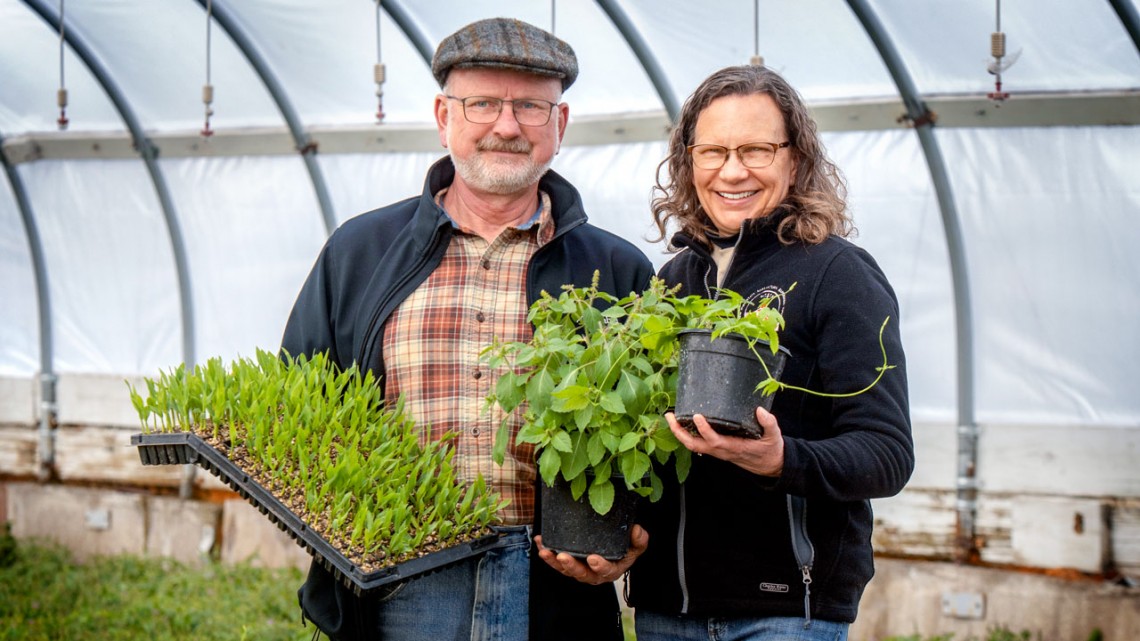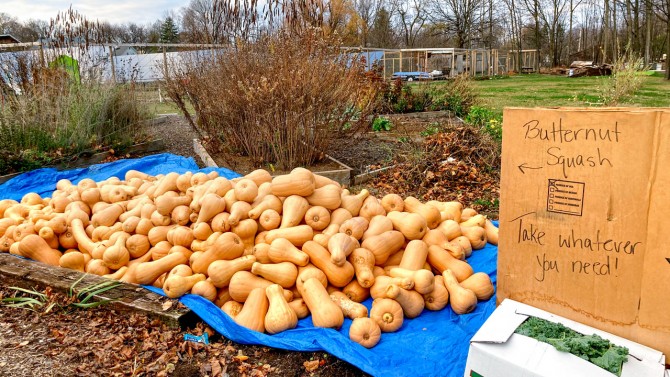
Alumni Rick and Laura Pedersen are pictured on their farm in Seneca Castle, New York.
Alumni couple named Alliance for Science’s Farmer of the Year
By Chris Knight
As hunger rose in the face of the global COVID-19 pandemic, Rick ’81 and Laura MPS ’81 Pedersen responded by sharing the bounty of their farm with their local food bank in upstate New York.
The couple – owners of Pedersen Farms in Seneca Castle, New York, five miles west of Geneva in Ontario County – partnered with community activists to donate more than 90,000 pounds of produce to people in need. The Pedersens have joined other smallholder farmers across the United States in helping food banks meet an extreme increase in demand due to the pandemic and ensure there’s food on the table.
In recognition of their generosity and dedication to farming, the Pedersens have been selected as the Cornell Alliance for Science 2020 Farmer of the Year. The award was established in 2015 to honor outstanding smallholder farmers across the globe.
“It’s distressing to think about that many people in our community need food,” Laura Pedersen said. “I just feel good that for us, we had a decent growing year. I feel like it’s our duty to give back as much as we can, because we’ve been fortunate compared to many other people in other businesses.”
The Pedersens have been innovators in New York state agriculture. Rick has emerged as a leader in hops production in the Northeast; Laura worked as a Cornell Cooperative Extension agent for vegetables for many years before the farm required her full attention.
The Pedersens, who grew up in the Finger Lakes, met during a summer working at the New York State Agricultural Experiment Station – now known as Cornell AgriTech – in Geneva.
The couple started a small farm in 1983, after earning degrees from the College of Agriculture and Life Sciences. Today, they manage a 1,000-acre farm that includes 800 acres of certified organic farmland.
“The Pedersens have been dedicated community members,” said Sarah Evanega, executive director for the Alliance for Science and faculty in the Department of Global Development and School of Integrative Plant Science. “They succeeded in developing a viable and productive family farm, which is difficult in these challenging times.”
The farm’s growth over the past 30 years depended largely on demand from restaurants in urban centers like New York City. As COVID-19 lockdowns in the spring disrupted food markets for farmers and consumers nationwide, the initial shock left food banks overwhelmed, grocery stores cleaned out, restaurants shuttered and farmers facing an enormous surplus.
This stressful new reality required a pivot, Rick said.
“The bulk of our products went to New York City into the restaurant trade,” he said. “That basically went in half or less. With the government programs for food assistance through the COVID programs, we were able to sell quite a bit of squash and kale, particularly into food banks … as far [away] as Florida. When we thought we were going to have a horrible year, we had an OK year.”
Thanks to the successful change in their marketing strategies, the Pedersens enjoyed a successful production season. However, they knew that people locally were still struggling, and saw an opportunity to pay it forward.
They connected with BluePrint Geneva, a local food and environmental justice organization.
“Pedersen Farms was so generous with us through this pandemic in helping meet people’s food security needs,” said Jackie Augustine, BluePrint’s executive director.
In April, the Pedersens donated more than 75,000 pounds of butternut squash to be distributed through a local mutual aid network coordinated by BluePrint. The Pedersens donated another 3,600 pounds of organic butternut squash this fall, along with 15,000 pounds of kale.
“(Rick Pedersen) was able to get that squash cleaned up and out to us for distribution to people directly right before Thanksgiving,” Augustine said. “There was also kale available. Rick’s crew was able to get that kale washed and boxed so that we could bring that kale to our sites. We’re definitely so appreciative. They went above and beyond.”
Read the full version of this story on the Cornell Alliance for Science website.
Chris Knight is a communications specialist with the Cornell Alliance for Science.
Media Contact
Get Cornell news delivered right to your inbox.
Subscribe

